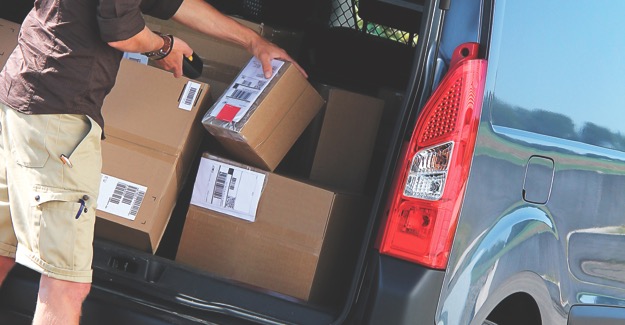Sofa surfers might be helping our traffic problems
- Fewer than one in twenty-five vans on UK roads are delivering packages to shoppers and businesses
- Online retailing has helped limit total traffic growth by keeping shoppers at home
The huge growth in UK van numbers is not being driven by people turning to online shopping.
While there are now at least 3.7 million vans on the road, fewer than one in twenty-five (4%) are involved in delivering orders to consumers and businesses.
Analysis for the RAC Foundation suggests that in 2016, 2.7 billion packages were delivered in the UK.
Around 1.8 billion of these were so-called business-to-consumer (B2C) deliveries, the vast majority of which will have been the result of online shopping (e-commerce).
A further 700 million or so packages were delivered on a business-to-business (B2B) basis.
The balance will have been deliveries sent by consumers to other consumers or business: (C2X) deliveries.
But while only 4% of vans will be involved in parcel delivery, they do account for a disproportionately high number of miles travelled; some 10% of all van mileage.
This means that one in ten of the vans people encounter on the roads are engaged in parcel and packet deliveries, much of which is the result of e-commerce.
The work by Professor Alan Braithwaite of LCP Consulting says that the average UK household buys something online at least 2.5 times a month.
But Professor Braithwaite suggests the growth in web retailing might actually have helped limit total traffic growth as people use their cars less to get to the shops.
The report highlights data from the 2015 National Travel Survey which shows that in England since 2002:
- The number of personal shopping trips made by car has reduced by 14%
- The distance travelled by car for personal shopping trips has reduced by 19%
The report also shows that vans are the fastest-growing traffic segment in the UK:
- Van mileage has grown 70% in the past 20 years
- This compares with car mileage growth of 12%, and 5.5% for lorries over the same period
- At the end of 2016 there were 3.7 million vans on the road
Looking ahead:
- B2C parcel volumes – predominantly the result of e-commerce – are growing at 9% per annum though this is expected to fall to 6% over the next four years
- The rate of growth in B2C parcel volumes is less than the growth of the online retail market which is growing at 10-12% per annum. This is likely to be due to the increased use of click-and-collect
The report speculates whether widespread delivery van use is only a stepping stone to local solutions which might involve micro collection hubs, drones or even robots.
Professor Braithwaite defines a van as “goods vehicles below 3.5 tonnes in weight including the payload”.
Van types include: the panel van, Luton vans, tippers, flatbeds, dropsides and pickups.
Steve Gooding, director of the RAC Foundation, said:
“Plenty of people suggest the surge in van traffic is down to our rapidly deepening love affair with online shopping. But this research suggests that sofa surfers might be helping to ease our traffic congestion woes. E-commerce is not the only, nor even the biggest, driver of the rise in vans.
“Overall, the implications for our roads could be positive, where several car shopping trips are replaced by one van delivering to multiple households, though there is an issue where personal goods are being delivered to city centre offices through already congested streets.
“Meantime, the question of why there are so many more vans is still a puzzle. Could it be the product of more small businesses and sole traders investing in vans and then using them both as a work tool and for family transport?”
ENDS
Contacts:
Philip Gomm – Head of External Communications – RAC Foundation
020 7747 3445 | 07711 776448 | [email protected] | 020 7389 0601 (ISDN)
Notes to editors:
The RAC Foundation is a transport policy and research organisation that explores the economic, mobility, safety and environmental issues relating to roads and their users. The Foundation publishes independent and authoritative research with which it promotes informed debate and advocates policy in the interest of the responsible motorist.
The RAC Foundation is a registered charity, number 1002705.
This is a link to an embargoed copy of the report:
All the Foundation’s work is available on its website:



